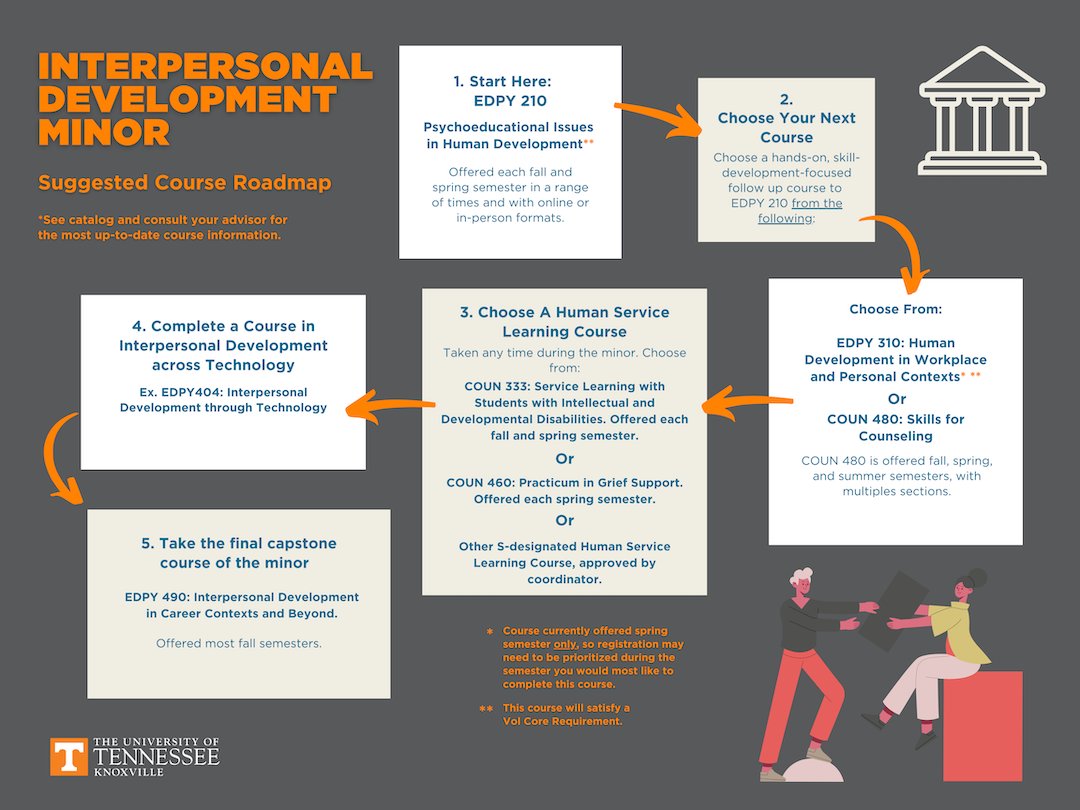You’re conquering the technical knowledge of your major. …But what about the people skills?
With its focus on human development, human service, and communication, the Interpersonal Development Minor can amplify your degree and round out your credentials as a competitive professional.

“Employers are looking for college graduates that can work effectively with lots of different types of people.”
…Getting along with and being able to collaborate with others is essential in today’s team environments…”
–Keeli Boyce, Express Strategic Services
Continued below in ‘Program Endorsements’ tab
Successful interpersonal and professional relationships are key in today’s evolving workplace environment, but they don’t always come about naturally. There are approaches we can study and strategies we can learn that will set us up for optimally effective relationships in the workplace, and beyond.
You can excel as a valuable asset to your professional field by studying and applying the human development, human support, and communication concepts found within the scholarship of Educational Psychology & Counseling.
 “We need employees within our company who can effectively work outside of silos and with our various levels of employees.
“We need employees within our company who can effectively work outside of silos and with our various levels of employees.
…Having a capacity to appreciate diversity in the workforce – in all its forms – is critical to our company’s success…”
–Emilie Denson, North American Denso Manufacturing
Continued below in ‘Program Endorsements’ tab
Still deciding on a major?
Thinking about a career in a people-oriented field, or perhaps a STEM field, but not sure where you fit in?
No Problem!
The Interpersonal Development Minor is the perfect conduit for exploring human service related fields and rapidly growing STEM careers that you may have not yet considered, while gaining college credit for a minor, and simultaneously learning to engage effectively in diverse and dynamic workplace environments in any chosen sphere. (Or even in your personal relationships!)
Moreover, the Department of Educational Psychology and Counseling houses numerous distinguished graduate degree programs for you to explore through the minor that can advance your degree and expose you to rapidly growing career fields that are experiencing increasing demand.
These careers include: School Psychologist, School Counselor, Clinical Mental Health Counselor, Higher Education Instructor, Adult Education Specialist or Researcher, Workplace Training and Development Specialist, Program Evaluation Consultant, and careers in STEM fields such as Psychometrician, Program and/or Testing Analyst, Statistical Analyst, and more.
We are excited that you are considering the many benefits of the Interpersonal Development Minor. More detailed information about the minor can be found in the tabs below.
Please do not hesitate to reach out with any questions by filling out the “Request More Info About the Interpersonal Development Minor” form below.
And, don’t forget to follow us on social media for the most up-to-date departmental news and information.
Seeking a useful course of study to bolster your degree?
Interpersonal Development Minor has entered the chat.
The Interpersonal Development Minor is designed to augment an array of UTK majors to form a comprehensive career foundation. We do this by taking a multidisciplinary approach that combines the Department’s robust curriculum in mental health counseling, school counseling, technology in learning, school psychology, assessment and methodologies, and lifelong learning for people of all ages, abilities, and backgrounds.
The Interpersonal Development Minor prepares students to engage effectively in diverse and dynamic modern workplace environments, and beyond, by examining key interpersonal communication and human support skills, lifelong learning concepts, and mental health approaches. The minor guides students to advance their own interpersonal skills and apply those skills to professional and life development, while studying approaches to the development of interpersonal skills in others. Students cultivate relational and communication skills, as well as critical thinking and practical experience, which together form a professional foundation that will serve them as they are promoted to leadership roles and throughout their careers. Interpersonal Development Minor students graduate with knowledge and expertise that helps them excel above and beyond those who possess only the technical skills of their careers.
- The Interpersonal Development Minor pairs perfectly with STEM majors (i.e., science, technology, engineering, and mathematics) as well as other degrees that train students for careers in fields of great technical expertise, as it provides complementary skills needed for leadership and effective workplace and personal relationships. Students gain the interpersonal and collaborative prowess necessary to successfully navigate the complexities of the modern workplace, and thrive.
- The minor is also an excellent explorative pathway for students who are drawn toward a career working with people, but unsure of the right career fit. The capstone course and other coursework help expose students to some of the lesser-known human service, “people work,” professions such Educational Psychology, Adult Learning, Clinical Mental Health Counseling, and School Counseling.
- Finally, the minor complements an array of other academic programs within the university with its focus on people-oriented skills and human development gleaned from the scholarship of educational psychology, mental health counseling, lifelong learning methods, and measurement methodologies.
- Identify and refine evidence-based interpersonal skills for successful workplace and personal relationships.
- Identify personal strengths, and areas to improve, for optimally effective workplace and personal relationships.
- Reflect on, explain, and analyze how individual differences in background (e.g., race, gender, sexual orientation, and context) can both challenge and enhance workplace and personal relationships.
The Learning Experience
Through the minor, students will engage in purposefully designed learning experiences that explore widely useful theories, concepts, and skills from multiple EPC fields, including counseling, psychology, adult learning, learning design, evaluation, and data-informed decision making.
Suggested Course Sequence
The minor consists of 15 credit hours. Students may complete the Minor requirements in any order, up to the capstone course. However, the optimal suggested course order is detailed below.
*See the Academic Catalog for the most up-to-date course information.
1. Start with EDPY 210: Psychoeducational Issues in Human Development
Course Description: Content and course activities involve application of critical thinking to contemporary research and practice issues in physical, cognitive, social, psychological, and values development. The overall goal of the course is to enhance students’ ability to evaluate the validity of information pertaining to human development and to use that information in promoting both individual well-being and a more humane world community.
This course is offered each fall and spring semester at a range of times and in-person or online formats.This course satisfies the Vol Core General Education Requirement: (SS)This course will satisfy the Vol Core Requirement in Social Sciences.
2. Next, choose from one of the hands-on, skill-development follow up courses to EDPY 210:
EDPY 310: Human Development in Workplace and Personal Contexts
Course Description: Students develop communication skills necessary for optimally effective professionals in a broad range of careers, as well as for optimal personal relationships (e.g., friendships, romantic and family relationships). Communication skills include: active listening, empathy, relational boundaries, giving and receiving feedback, openness to others and other’s views, and assertiveness of ones’ self and views. Students explore an understanding of themselves as cultural beings and how their separate identities impact their communication with others. In addition, students will engage in meaningful discussion about mental health and gain an awareness of resources related to mental health.
This course is currently offered each spring semester only, with only one section. Therefore, you may need to prioritize this course during registration.
EDPY 310 will satisfy the Vol Core Requirement in Applied Oral Communication
OR
COUN 480: Skills for Counseling
Course Description: An introduction to basic helping skills necessary to the preparation of counselors, teachers, and others involved in human service delivery.
This course is offered fall, spring, and summer, with multiple sections during each fall and spring.
3. Choose a Human Service Learning Course – Taken at any time during the minor. Choose from:
COUN 333: Service Learning with Students with Intellectual and Developmental Disabilities
Course Description: Through service learning experiences, students will learn about post-secondary education for young adults with intellectual and developmental disabilities. Service learning requirement of a minimum of 60 hours outside the classroom.
In this course students learn through assisting young adults with intellectual and developmental disabilities in the UT FUTURE Program.
This course is offered each fall and spring semester.
OR
COUN 460: Practicum in Grief Support
Course Description: Supervised practice and application of knowledge and skills about grief, loss, and life transitions. In this course, students are guided and supervised through the work of mentoring children and youth in area schools who are grieving the loss of a parent or other close loved one.
This course is normally offered each spring semester.
OR
Other S-designated Human Service Learning Course approved by the Minor Coordinator.
4. Complete a Course in Interpersonal Development Across Technology: Currently, EDPY 404: Interpersonal Development through Technology
This course is offered spring semester of 2023.
5. Complete the final, or capstone, course of the minor:
EDPY 490: Interpersonal Development in Career Contexts and Beyond
This course will be offered most fall semesters.
 Emilie Denson, North American Denso Manufacturing:
Emilie Denson, North American Denso Manufacturing:
“Interpersonal development and the knowledge and skills that come with it are necessary within the workplace on a daily basis. We need employees within our company who can effectively work outside of silos and with our various levels of employees.
…Having a capacity to appreciate diversity in the workforce – in all its forms – is critical to our company’s success. Effective use of interpersonal knowledge and skills helps build mutual respect and trust within a work setting and with one’s team-mates. This respect and trust often enhances the quantity and quality of ideas and supports needed change and problem resolution.
When you engage in the resume writing and job interview process, showcase your participation in this Interpersonal Development minor in addition to your discipline specific or technical knowledge and skills…Let your potential employer know that you understand the importance of effective interpersonal development in the workplace.”
 Keeli Boyce, Express Strategic Services:
Keeli Boyce, Express Strategic Services:
“Employers are looking for college graduates that can work effectively with lots of different types of people. For example, there may be as many as five different generations working within a given group. Getting along with and being able to collaborate with others is essential in today’s team environments.
Participating in this Interpersonal Development minor demonstrates that you have some awareness of the importance of these knowledge and skills. You will be able to demonstrate your openness to growing in this arena, your capacity to empathize and put yourself in another person’s shoes, and a willingness to explore your own strengths and weaknesses.
…When you prepare for post-graduate job opportunities, you need to differentiate yourself from all of the other resumes/interviews. Bring attention to your participation in this minor as one way to separate yourself from the pack.”
Request More Info About the Interpersonal Development Minor


